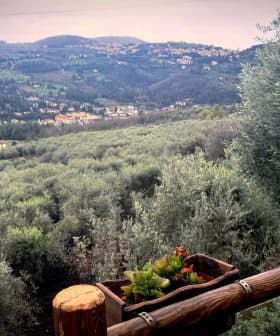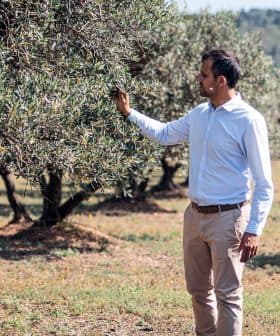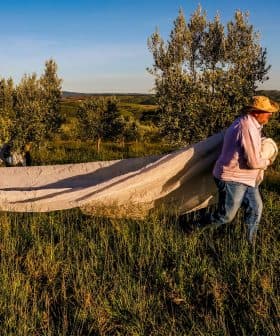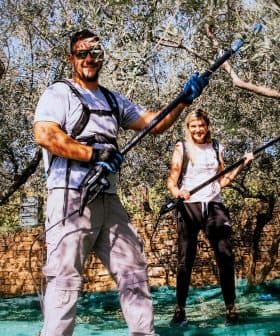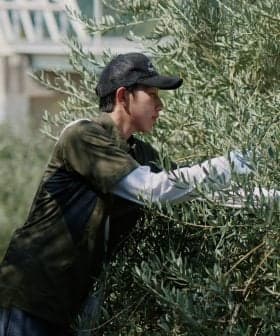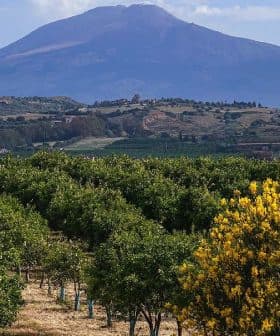From Whisky to Olive Oil, Bozelli Boss Highlights the Value of Skillful Blending
The Turkish producer and World Competition winner believes masterful extra virgin olive oil blends exceed the sum of their parts.
 Mustafa Birhan Hazer and his wife, Esra
Mustafa Birhan Hazer and his wife, Esra Bozelli founder Mustafa Birhan Hazer was inspired by the whisky industry to create highly customizable extra virgin olive oil blends, using select olive varieties and expert blending techniques. Despite facing challenges due to climate change, Hazer’s dedication to quality and innovation has led Bozelli to win Gold Awards and contribute to the growing awareness and appreciation of high-quality olive oil in Turkey.
“My inspiration came from the whisky industry, which I was part of after 2001,” Bozelli founder Mustafa Birhan Hazer told Olive Oil Times.
“I know that single malts are excellent. But, while they are great on their own, when a master blends them, you can achieve such a complex and rich blend greater than the sum of its parts,” he said. “Of course, it is an art; you need talent.”
We believe that this is the beginning of a new era, and we are happy to be at the forefront of that journey.
The pursuit of highly customizable extra virgin olive oil blends has led the award-winning producer to plant select olive varieties since it started operations in 2010.
“The choice of varieties gives us absolute uniqueness in our blends and ‘single malts,’ if I may call them that,” Hazer said. “We custom-design blends for our business partners as well, to business owners who prefer a world-class olive oil which is unique to them.”
See Also:Producer ProfilesBozelli also cultivates the most popular local varieties, including Domat, Edremit and Gemlik, along with Arbequina, Arbosana, Koroneiki and Picual.
Two hybrid varieties – Skitita, a Picual and Arbequina hybrid, and Lecciana, a Leccino and Arbosana hybrid – were planted later. Both are highly adaptable and were originally developed for super-high-density (super-intensive) olive growing.
“All of these cultivars cover a wide range of choices for us,” Hazer said. “Some produce delicate extra virgin olive oil, while others are more robust. Some of them are more floral. Some are well known for their high polyphenol content.”
Today, Bozelli manages around 21,000 olive trees cultivated on more than 40 hectares. Hazer said the key to the company’s olive blending success is his wife, Esra.
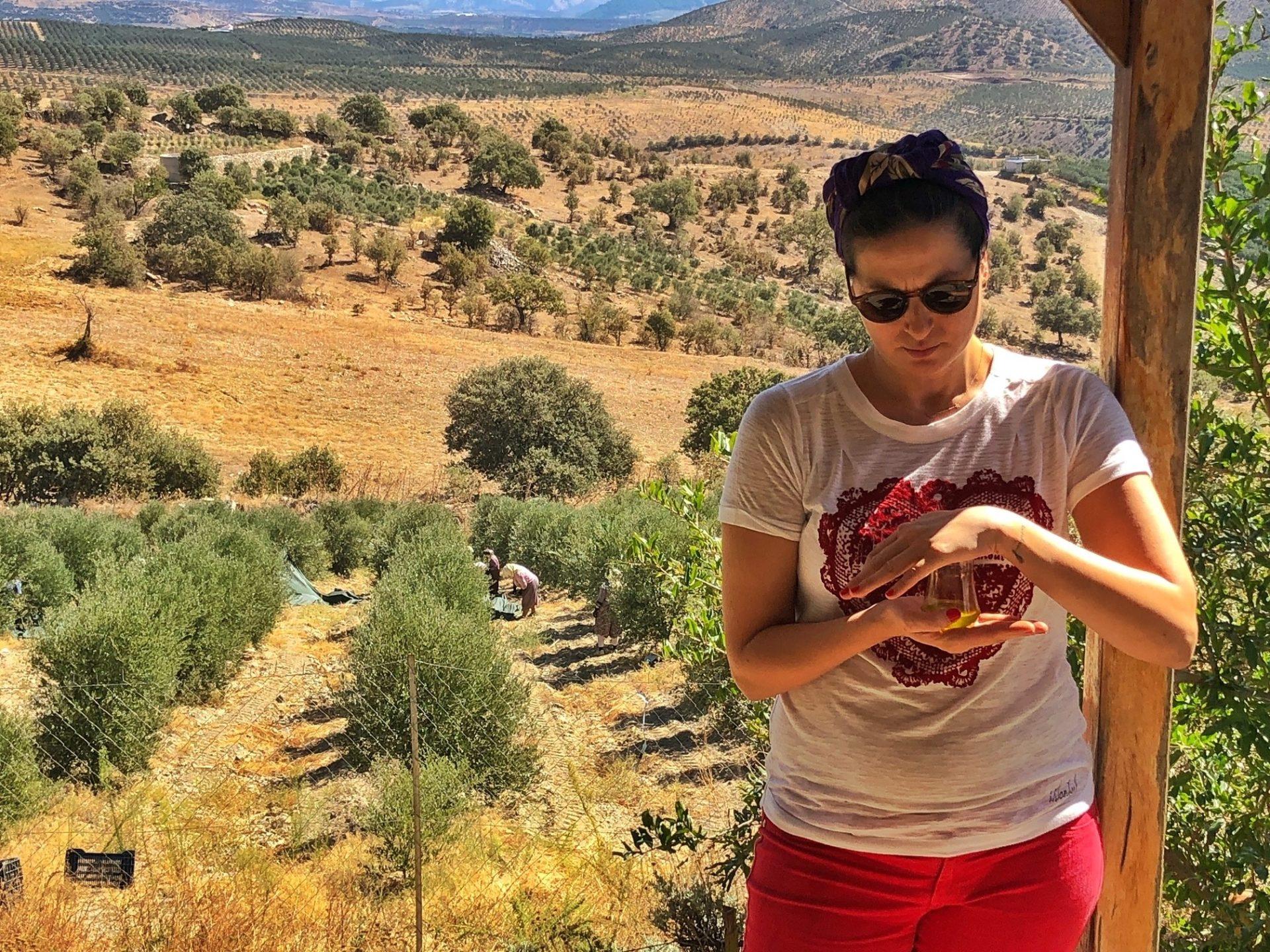
Bozelli’s olive groves in Turkey’s Aegean region
“My wife received training in Turkey and Italy to master tasting and blending,” he said. “She is the nose and the master blender of our olive oils.”
While the Bozelli brand was established in 2010, the company has older roots; Hazer’s grandfather began growing and milling olives in the first half of the 20th century.
“He was a talented mechanic and built many olive mills in the young Turkish republic back then,” said Hazer, adding that his grandfather heavily influenced him and the company.
“My grandfather used to say that the olive tree loves the wind, sun, stone and steep hills,” said Hazer, whose groves are 500 to 600 meters above sea level. “We chose an inland area of the Aegean Region. I chose a higher altitude because ingredients for spirits tend to taste better when subjected to controlled climatic stress.”
The olive groves are located on the outskirts of Bozburun, a village in Manisa province known for its hills and winds. “It gets 300 days of sunshine each year on average, and the soil is sandy with many stones,” Hazer said. “The elevation helps us with daily temperature fluctuations and managed water stress from our irrigation.”
All Bozelli olive trees are irrigated following a specific protocol. “We try to optimize quantity and quality by applying deficit irrigation techniques after pit formation until pulp’s build-up stage begins, sometime in August,” Hazer said.
As the season approaches its end, and depending on temperatures, irrigation completely halts at least two weeks before harvest.
Bozelli is also developing fertigation techniques in which nutrients necessary for the olive trees are dissolved into the water. Hazer said determining the correct dosage and best time to fertigate are his main challenges.
“We are experimenting and improving every year,” he added. “It is doing wonders for our extra virgin olive oils.”
One of the two Gold Awards won at the 2023 NYIOOC World Olive Oil Competition was for Bozelli’s Picual monovarietal. The Spanish olive is grown at all latitudes and is responsible for a significant percentage of global olive oil production. Bozelli’s Koroneiki monovarietal earned the other Gold Award.
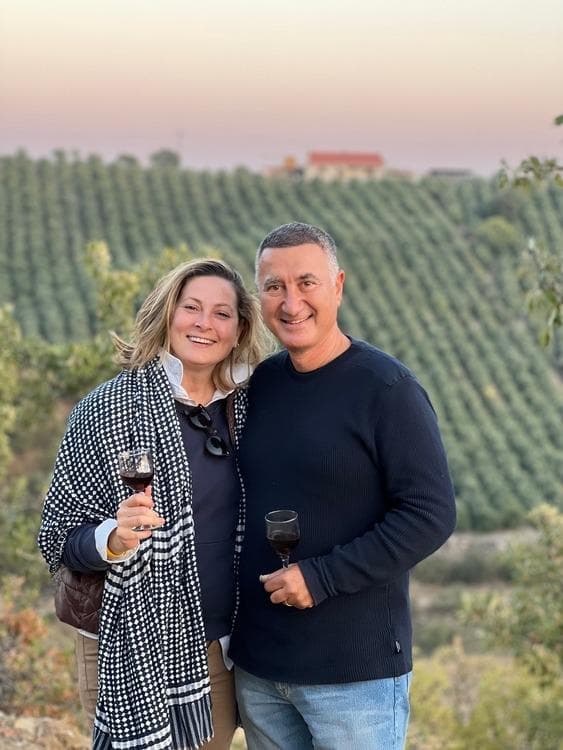
Mustafa Birhan Hazer and Esra celebrated two Gold Awards at the 2023 NYIOOC.
“I found just one sample of Picual in 2012, we populated it, and now we produce the only Picual olive oil in the whole of Turkey,” Hazer said. “Given its status as one of the world’s most awarded varieties, it was our interest to introduce it to Turkey right from the start.”
“It is a balanced, robust extra virgin olive oil with a long finish,” he added. “It expresses notes of peach first and then apricot, tomato and black pepper in the background.”
The Gold Awards came after a challenging season for the Turkish producer. “It was a tough season,” Hazer confirmed.
“Every season comes with a new story, driven by climate change,” he added. “In March 2022, in the second half of the month, after the trees ‘woke up’ for spring, our area was subject to temperatures around ‑5°C or ‑7°C every night. It was near freezing during the day.”
In the Aegean region, March 2022 was the coolest March of the last 40 years. “This caused damage, and the harvest was low,” Hazer said.
“And then, summer came with extreme heat,” he added. “We coped with it also thanks to the wells and drip irrigation networks in our groves.”
However, the coming season’s lead-up is quite different from last year. “Unlike Spain, Turkey is having a wet spring, which is great news for us,” Hazer said. “As we have not yet even entered the flowering stage, it is hard to predict the harvest at this stage, but we have reason to be hopeful.”
“The challenge for us is to manage humidity and squeeze in foliar applications of micro-elements into dry breaks, which has become part of the reason for our oil quality,” he added.
Hazer sees a bright future for high-quality olive oil production in Turkey, a country whose long-standing olive farming tradition dates back to the ancient Romans’ presence there.
“Today, with many new boutique brands like Bozelli, awareness, interest and appreciation of top olive oil quality among consumers is growing in Turkey,” he said.
“This trend of improved olive oil quality we observe in the number of awards Turkish brands get in NYIOOC over the years,” Hazer added. In 2023, Turkey’s olive oil producers earned 74 awards, nine more than they did in 2022 and 30 more than in 2021.
“Consumers are increasingly curious and trying better quality olive oils,” Hazer said. “Many begin to build their knowledge about this liquid like they do for wine or vinegar. We believe that this is the beginning of a new era, and we are happy to be at the forefront of that journey with our varieties.”
Share this article


